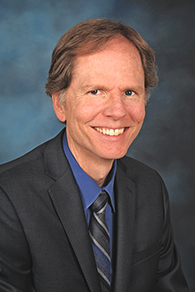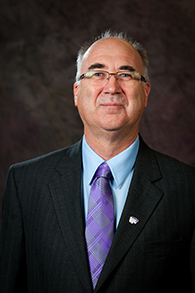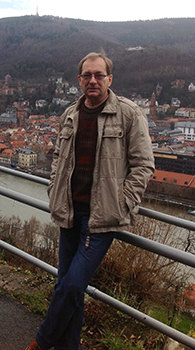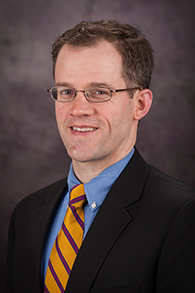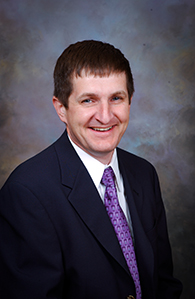Five faculty members named newest university distinguished professors
Thursday, May 2, 2013
MANHATTAN -- Five Kansas State University faculty members have been chosen as the newest university distinguished professors -- a lifetime title and the highest honor the university bestows on its faculty.
The new university distinguished professors are: James Edgar, department head and Tom H. Barrett professor in chemical engineering; Stephen Higgs, director of the Biosecurity Research Institute, associate vice president for research and the Virginia and Perry Peine biosecurity chair; Ryszard Jankowiak, professor of chemistry and ancillary professor of physics; Philip Nel, professor of English and director of the graduate program in children's literature; and Mike Tokach, professor of animal sciences and industry and a K-State Research and Extension specialist.
"We congratulate our newest university distinguished professors, all of whom have had significant impact on their fields and Kansas State University," said Kansas State University Provost April Mason. "Each of these individuals is internationally recognized for their distinguished contributions to research, scholarship and teaching. These five individuals further enrich our outstanding group of university distinguished professors and inspire all of us to excellence."
University distinguished professors are appointed following a universitywide competition conducted by the provost.
"All five of our newest university distinguished professors represent the best among their fields and are among the best at the university," said Kansas State University President Kirk Schulz. "We greatly appreciate all that they have done to advance their fields, inspire future researchers and academics, and improve the lives and knowledge of individuals in Kansas and around the world. They will play a key role at Kansas State University as we move forward to becoming a Top 50 public research university by 2025."
Each of this year's five recipients has received national and international recognition for his work.
* Edgar pioneered research on the crystal growth, epitaxy, characterization and device fabrication of wide band-gap semiconductors, including nitride and boride compounds rather than the more common silicon. His advancements have improved the materials that are used in microelectronic devices, such as laser diodes, that have revolutionized communications, transportation, lighting, medicine and consumer applications.
Edgar has received more than $9 million in research funding from the National Science Foundation, U.S. Department of Defense and U.S. Department of Energy. He has authored or co-authored more than 150 papers in scientific journals, edited two books and has presented more than 25 national and international lectures. He has served as the William H. Honstead professor in chemical engineering. He also has received the Commerce Bank Distinguished Graduate Faculty Award, College of Engineering Research Excellence Award, Making a Difference Award and the Sigma Xi Outstanding Scientist Award. He spent sabbaticals at the Naval Research Laboratory and Radbound University in the Netherlands.
At the university, Edgar has advised 27 advanced-degree students and directed the research of 22 undergraduate students. He is a member of the Program Assessment Coordination Committee, Graduate College Assessment Review Committee and chair of the Chemical Engineering Graduate Students Committee. He also has served on the Graduate Council. He has taught nine different undergraduate courses and five different graduate courses. He also has been a symposium organizer for the Materials Research Society, a National Science Foundation review panelist and a reviewer for NASA's postdoctoral program, among others.
Edgar joined the university in 1988 as an assistant professor. He earned his bachelor's degree from the University of Kansas in 1981 and his doctorate from the University of Florida in 1987 -- both degrees in chemical engineering. He is a native of Hutchinson.
* Higgs is an arthropod-borne infectious disease expert, focusing on vector biology, mosquito-borne infectious diseases, immune modulation and vaccine evaluation. He is studying mosquito-virus-vertebrate interactions and their relationship with various viruses, including West Nile and yellow fever.
Higgs has worked with investigators from multiple institutions on projects that have been supported by more than $30 million from agencies and companies, including the National Institutes of Health, U.S. Department of Agriculture and Centers for Disease Control and Prevention. He has authored more than 135 articles in peer-reviewed journals and has been an invited lecturer at more than 60 international meetings and conferences. His awards include being elected to the honor society of Phi Zeta, serving as the 51st Bailey K. Ashford Memorial Lecturer, a Pasteur Foundation guest scholar, and the Experimental Pathology Graduate Student Organization award for Excellence in Graduate Teaching and Mentoring, among others.
Currently, Higgs mentors two doctoral students. He is an elected fellow of the Royal Entomological Society and the American Society of Tropical Medicine and Hygiene, and a member of the Royal Society of Tropical Medicine and Hygiene, the American Society for Virology and the Society for General Microbiology. He also serves as the editor-in-chief of the journal Vector Borne and Zoonotic Diseases and is on the editorial board for the journal Biosecurity and Bioterrorism: Biodefense Strategy, Practice and Science.
Higgs joined Kansas State University in 2011 as the research director of the Biosecurity Research Institute. He earned his bachelor's degree from King's College in London in 1980, and his doctorate in parasitology from Reading University in Reading, U.K., in 1985.
* Jankowiak is one of the world's leaders in high-resolution, frequency domain, laser-based spectroscopies -- a field that allows for the elucidation of excited electronic state structure and measurements of ultrafast dynamics in complex biological systems. His work is complementary to various time-domain spectroscopies, and helps explain the excited electronic state structure by providing information not possible through other methods. His current research interests include molecular electronic spectroscopy, laser-based spectroscopies, low-temperature protein dynamics, as well as the excitation energy and electron transfer processes in photosynthesis.
Since joining Kansas State University in 2005, Jankowiak has receive more than $2 million in research funding from the U.S. Department of Energy, National Science Foundation, National Cancer Institute and others. He has published more than 200 papers in refereed journals and has presented more than 100 lectures at international conferences and more than 50 invited talks at various universities around the world. His honors include the 2012 Professorial Performance Award, Outstanding Senior Scientist for the Sigma Xi Society K-State chapter, the R&D100 Award for the CE-FLN System, International Cancer Technology Transfer Award and the Iowa State University Professional and Scientific Excellence Award.
At Kansas State University, Jankowiak has advised seven advanced-degree students, eight postdoctoral research fellows, six undergraduate students and several students in the Research Experiences for Undergraduates summer program. He is a member of the American Association of the Advancement of Science, New York Academy of Sciences, American Chemical Society, fellow of the International Union Against Cancer and a fellow of the Australian Institute of High Energetic Materials. He serves as the associate editor for Versita Open Access Book Publisher, and is on the executive committee of the Kansas State University Research Foundation and an editorial advisory board member of Scientific Journal International.
Jankowiak earned his bachelor's degree in mathematics from Poland's Teachers College in 1969, his master's degree in solid-state physics from Adam Mickiewicz University in Poland in 1974 and his doctorate in condensed matter physics and spectroscopy from Technical University of Gdansk in Poland in 1981. During his obligatory military service, he earned the rank of second lieutenant in the Polish navy in 1975. From 1981-1985 he worked at the department of physical chemistry in Philipps University in Marburg, Germany, and from 1985-2005 at the Department of Energy's Ames Laboratory at Iowa State University, where he established a highly-visible research program in chemical carcinogenesis.
* Nel specializes in children's literature and culture, particularly Dr. Seuss, Crockett Johnson and J.K. Rowling's "Harry Potter" series. He has authored or been the editor of eight books, including "Tales for Little Rebels," which received a positive review by The New York Times, and "The Annotated Cat: Under the Hats of Seuss and His Cats," which was profiled by Newsweek magazine. His most recent book, "Crockett Johnson and Ruth Krauss: How an Unlikely Couple Found Love, Dodged the FBI, and Transformed Children’s Literature," received a positive review from the Wall Street Journal and is nominated for a 2013 Will Eisner Comic Industry Award in the Best Educational/Academic Work category. He has 21 refereed articles, three of which he co-authored, and has authored nine non-refereed articles.
Nel has been featured in more than 300 national and international media outlets, including CBS' "Sunday Morning"; NPR's "Talk of the Nation," "Morning Edition," "Weekend Edition" and others; C-SPAN2's "Book TV;" USA Today; Washington Post; U.S. News and World Report; CNN; CBC in Canada; ABC in Australia; and RTE Radio 1 in Ireland. He has given invited lectures at Dartmouth College, Stanford University, the Smithsonian Institution, the New York Public Library, the University of British Columbia and various other institutions in the U.S., U.K., Canada, Sweden and Norway.
Nel serves as editor of Routledge's Children's Literature and Culture series -- the longest-running and most prestigious series of children's literature scholarship -- and was a consultant on an A&E biography about Dr. Seuss. He has received the National Endowment for the Humanities summer stipend, a Smithsonian Fellowship, Big 12 Faculty Fellowship, the Children's Literature Association's Article Award, the Commerce Bank Distinguished Faculty Award and the Stamey Award for Excellence in Teaching. He is a member of the Children's Literature Association and its Book Award Committee, Modern Language Association, Children's Literature Association, American Studies Association, International Research Society for Children's Literature and Phi Beta Kappa. He also is a co-founder of the Don DeLillo Society.
Nel joined Kansas State University in 2000 as an assistant professor. He earned his bachelor's degree in English and psychology from the University of Rochester in 1992, and his master's degree and doctorate from Vanderbilt University in 1993 and 1997, respectively.
* Tokach researches practical swine nutrition and works with producers on rapid adoption and technology transfer to Kansas livestock producers. He has authored 204 articles in scientific journals, six book chapters and more 700 extension and non-refereed articles. He has received more than $4 million in research funding from organizations, including the National Pork Board, the Department of Agriculture's National Institute of Food and Agriculture, and numerous industry partners. He has been awarded seven patents for his research. He has given more than 100 invited lectures at national and international conferences, and has developed multiple in-depth nutritional education programs for veterinary students and veterinarians, extension specialists and feed industry personnel.
Additionally, Tokach is a member of an aggressive swine extension group with fellow faculty members Jim Nelssen, Steve Dritz, Joel DeRouchey and Robert Goodband, as well as graduate students advised by the researchers. The group has generated more than $3.5 million in gifts to Kansas State University for construction to facilities such as the gestation barn and weaning facilities to support extension research projects.
He has advised and mentored 39 advanced-degree students and visiting professors. He is a member of the American Society of Animal Science, the American Association of Swine Practitioners, Epsilon Sigma Phi, Gamma Sigma Delta, Phi Eta Sigma, Alpha Zeta, Phi Kappa Phi, Alpha Lambda Delta and his alma maters' alumni associations.
Tokach joined Kansas State University in 1991 as an assistant professor. He earned his bachelor's degree in animal and range science from North Dakota State University in 1986; his master's degree in animal science from Kansas State University in 1988; and his doctorate in animal science from the University of Minnesota in 1991. His wife, Lisa, also specializes in swine as a veterinarian at the Abilene Animal Hospital in Abilene.
